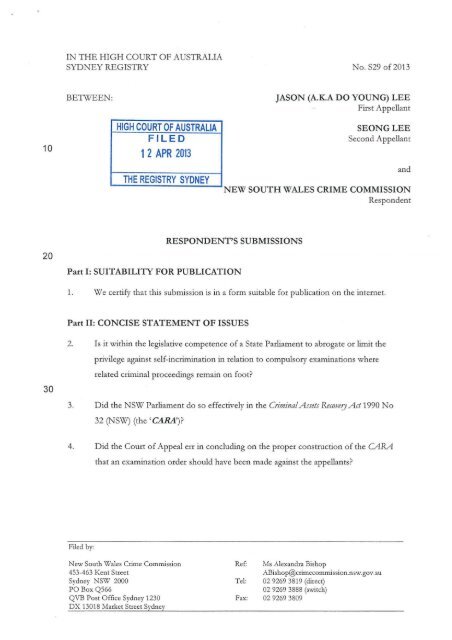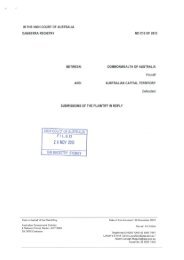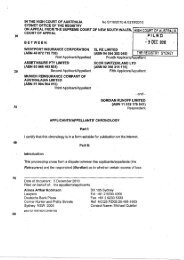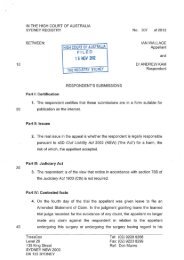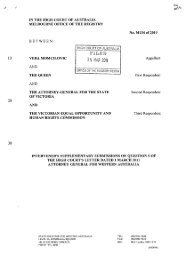Written submissions - High Court of Australia
Written submissions - High Court of Australia
Written submissions - High Court of Australia
Create successful ePaper yourself
Turn your PDF publications into a flip-book with our unique Google optimized e-Paper software.
IN THE HIGH COURT OF AUSTRALIA<br />
SYDNEY REGISTRY<br />
No. S29 <strong>of</strong>2013<br />
10<br />
BETWEEN:<br />
HIGH COURT OF AUSTRALIA<br />
FILED<br />
12 APR 2013<br />
THE REGISTRY SYDNEY<br />
JASON (A.K.A DO YOUNG) LEE<br />
First Appellant<br />
SEONGLEE<br />
Second Appellant<br />
and<br />
NEW SOUTH WALES CRIME COMMISSION<br />
Respondent<br />
20<br />
RESPONDENT'S SUBMISSIONS<br />
Part I: SUITABILITY FOR PUBLICATION<br />
1. We certify that this submission is in a form suitable for publication on the internet.<br />
Part II: CONCISE STATEMENT OF ISSUES<br />
2. Is it within the legislative competence <strong>of</strong> a State Parliament to abrogate or limit the<br />
privilege against self-incrimination in relation to compulsory examinations where<br />
30<br />
related criminal proceedings remain on foot?<br />
3. Did the NSW Parliament do so effectively in the Crimina/Assets Recovery Act 1990 No<br />
32 (NSW) (the 'CARA')?<br />
4. Did the <strong>Court</strong> <strong>of</strong> Appeal err in concluding on the proper construction <strong>of</strong> the CARA<br />
that an examination order should have been made against the appellants?<br />
Filed by:<br />
New South Wales Crime Commission<br />
453-463 Kent Street<br />
Sydney NSW 2000<br />
PO Box Q566<br />
QVB Post O ffice Sydney 1230<br />
DX 13018 Market Street Sydney<br />
Ref:<br />
Tel:<br />
Fax:<br />
Ms Alexandra Bishop<br />
ABishop@crimecommission.nsw.gov.au<br />
02 9269 3819 (direct)<br />
02 9269 3888 (switch)<br />
02 9269 3809
-2-<br />
Part III: NOTICES UNDER s78B OF THE JUDICIARY ACT1903 (CTH)<br />
5. We certify that we have considered whether notices should be given in compliance<br />
with s78B ]11diciaryAct 1903 (Cth) and note that s78B notices specifying the nature <strong>of</strong><br />
the matter said to arise under the Constitution have been issued by the appellants.<br />
Part IV: CONTESTED FACTS<br />
10<br />
6. Subject to the following comments, the respondent does not dispute the facts set out<br />
in the Appellants' Chronology and at the appellants' <strong>submissions</strong> at [6]-[21] ('AS[6]<br />
[21]').<br />
7. fu the entry in the appellants' chronology for 13 May 2010 and 11 J 11ne 2010. The second<br />
paragraph refers to the respondent (the 'Crime Commission') filing a summons 'itt<br />
20<br />
respect <strong>of</strong> property s11spected to be that <strong>of</strong> the first appellant (Jason Lee] and his tvifo.' At 11 June<br />
2010, Elizabeth Park is again described as the wife <strong>of</strong> Jason Lee. The orders sought in<br />
the Crime Commission's summons were in respect <strong>of</strong> interests in property <strong>of</strong> Jason<br />
Lee and not that 'mspected to be that <strong>of</strong> Jason Lee.' Further, there is no finding or<br />
evidence which suggests Elizabeth Park is Jason Lee's wife; whilst little turns on it, she<br />
is not.<br />
8. Re AS{21]. It is accepted that any examination <strong>of</strong> the appellants pursuant to the<br />
orders made by the <strong>Court</strong> <strong>of</strong> Appeal on 6 September 2012 the Crime Commission<br />
would touch on the matters referred to at AS[16] and that- at a factual level- there is<br />
an overlap between these matters the subject matter <strong>of</strong> the appeals (which were<br />
dismissed on 3 April2013) and the two trials for different <strong>of</strong>fences <strong>of</strong> money<br />
laundering. However, the Crime Commission disputes the implicit assertion at AS[21]<br />
that the orders made by the <strong>Court</strong> <strong>of</strong> Appeal on 6 September 2012 in some way dictate<br />
30<br />
the manner and form <strong>of</strong> the examinations conducted pursuant to them.<br />
9. ReAS[19]. The appeals from the criminal convictions were dismissed by the <strong>Court</strong> <strong>of</strong><br />
Criminal Appeal on 3 April2013: see Lee, Do You11g v R; Lee, Seo11g Won v R [2013]<br />
NSWCCA 66.<br />
1 AB12
-3-<br />
Part V: APPLICABLE LEGISLATION<br />
10. Save for one matter, the appellants' statement <strong>of</strong> applicable constitutional provisions,<br />
statutes and regulations is accepted. The Crime Commission adds reference to s71<br />
Civil Procedttre Act 2005 (NSW), a copy <strong>of</strong> which is contained in Annexure "A" to these<br />
<strong>submissions</strong>.<br />
Part VI: RESPONDENT'S ARGUMENT<br />
10 Power if the NSW Parliament to abrogate the ptivilege against se!f-inCiimination<br />
11. Parliament's capacity to abrogate or limit the privilege against self-incrimit1ation in<br />
relation to compulsory examinations has long been recognized: see Mottimer v Brown<br />
(1970) 122 CLR 493 at 499 and 502; Hammond v Comtnomvealth if <strong>Australia</strong> (1982) 152<br />
CLR 188 at 197.9 and 200.3; Sorby v The Commonwealth (1983) 152 CLR 281 at 309; and<br />
Hamilton v Oades (1989) 166 CLR 486 at 494.5, 500.9, 509.5 and 516.5.<br />
12. As Mason CJ said in Hamilton (at 494.5), citing Hammond and Sorby, it is plain that<br />
20<br />
compulsory examinations undertaken while charges are pending may expose the<br />
examinee to a risk <strong>of</strong> self-incrin1ination and, to that extent, may amount to an<br />
interference with the administration <strong>of</strong> crin1inal justice:<br />
'But it is well established that Pariian!Cnt is able to ''intetjm" with established common law<br />
protections, including the tight to refuse to answer questions the answer to which may tend to<br />
int~iminate the person asked<br />
13. Dawson J (at 509) said:<br />
30<br />
'The privilege against self-incrimination is not under our system if law inviolable ... '<br />
14. Toohey J, having noted (at 514.2) that the appeal involved 'a challenge to the whole<br />
examination proceeding while criminal charges at~ pending concluded the statute there under<br />
consideration had abrogated the self-incrin1ination protection and that the examination<br />
should be allowed to proceed.<br />
15. Hamilton was a case remarkably like the present: crin1inal charges pending, an<br />
examination to be conducted by an <strong>of</strong>ficer <strong>of</strong> the Supreme <strong>Court</strong>, the possibility <strong>of</strong><br />
self-incrin1inating answers being given which touch upon the crin1inal charges, and an
-4-<br />
express abrogation <strong>of</strong> the privilege against self-incrimination. The correctness <strong>of</strong><br />
Hamilton is not challenged by the appellants.<br />
16. In S orby (at 298.3), Gibbs CJ expressly rejected the proposition that the privilege<br />
against self-incrimination is protected by the Constitution; either as an incident to the<br />
guarantee given by s80 or <strong>of</strong> the unfettered exercise <strong>of</strong> judicial power. In reaching the<br />
same conclusion, the plurality held (at 308.2):<br />
10<br />
'Tbe privz!ege against selfinCiimination is not an integral element in tbe exercise <strong>of</strong> tbe judicial power<br />
reposed in tbe courts by Cb. III <strong>of</strong> tbe Constitution. It is a privilege tbat bas beetz abrogated by<br />
legislative action in <strong>Australia</strong>, tbe Umted Kingdom and Canada zvitbo11t mZ)'OIIC bavingpz~viousf)l<br />
suggested tbat it invo/t;ed tbe elimination <strong>of</strong> an integral element in tbe exercise <strong>of</strong>judicial power in a<br />
demom1tic sociery.<br />
No doubt, like otber featzms <strong>of</strong> our system <strong>of</strong> criminal justice, it bas a long bistory and confers a very<br />
valuable protection. But it is quite anotber tbing to S(ijl tbat it is an immutable cbaractezistic <strong>of</strong> tbe<br />
exercise <strong>of</strong> judicial power.'<br />
20<br />
30<br />
17.<br />
The Parliament's power to adjust the balance between competing public interests in<br />
the context <strong>of</strong> criminal proceedings was afflrmed by this <strong>Court</strong> in Nicholas v Tbe Qttem<br />
(1998) 193 CLR 173 per Brennan CJ at 197 [37], Toohey J at 203 [55], Gummow J at<br />
239 [164]-[167] and !-layne J at 275 [241]-[242]. As Mason CJ said in Hamilton (at<br />
496.5) it is a permissible legislative resolution <strong>of</strong> the conflict between public and<br />
private interests to provide for a compulsory examination and to give speciflc<br />
protection in relation to the principle matter covered by the privilege but not<br />
othetwise, except to the extent that protection is afforded by other statutory and<br />
inherent powers available to the <strong>Court</strong>. However, the inherent powers cannot be<br />
exercised so as to defeat the clearly expressed legislative intention: Hamilton per Mason<br />
CJ at 499.5, Dawson] at 510.5 and Toohey J at 516.8.<br />
18. Once this is accepted, it cannot be said that requiring the Supreme <strong>Court</strong> to order an<br />
examination during which the examinee may be required to give self-incriminating<br />
evidence -where the circumstances otherwise warrant such an order - compromises<br />
the institutional integrity in a manner which <strong>of</strong>fends Ch. III.<br />
19. By abrogating the privilege against self-incrimination in the context <strong>of</strong> compulsory<br />
examinations Parliament does not direct the manner in which judicial power is to be
-5-<br />
exercised in the sense discussed in I11ternatio11al Fi11a11ce Trttst Company v NewS out/J Wales<br />
Crime Commissio11 (2009) 240 CLR 319 at 352 [50], 355 [56]-[57]. If anything, requiring<br />
that such examinations take place despite the risk <strong>of</strong> self-incrimination merely<br />
prescribes the <strong>Court</strong>'s practice or procedure in the sense contemplated by Brennan CJ<br />
in Nicholas v The Queen at 188 [20] and 232 [143].<br />
20. Acknowledging the force <strong>of</strong> the principle referred to in AS[62] it does not go as far as<br />
is suggested in AS[63]. Abrogating the privilege against self-incrimination does not<br />
10<br />
20<br />
render 'unfair' any subsequent (or concurrent) criminal trial touching on the same<br />
subject matter as the examination; tlus conclusion must follow from the principles<br />
referred to in paragraphs 11 to 17 above. Moreover, when giving content to the<br />
requirement that a criminal trial be 'fair' there must be borne in mind this <strong>Court</strong>'s<br />
acceptance <strong>of</strong> the proposition that even a complete reversal <strong>of</strong> the onus <strong>of</strong> pro<strong>of</strong> in<br />
criminal proceedings would not be substantially inconsistent or incompatible with the<br />
continuing subsistence <strong>of</strong> judicial power: Nicholas v The Quem per Brennan CJ at 189-90<br />
[24] and the cases cited tl1erein. It must follow that abrogating the privilege against<br />
self-incrimination in the context <strong>of</strong> compulsmy examinations does not confer a power<br />
on a <strong>Court</strong> wluch is repugnant to or incompatible with the exercise <strong>of</strong> judicial power<br />
or its institutional integrity in the sense most recently discussed by the plurality in<br />
Assistant Commissiomr Michael James Condon v Pompano Pty Ltd [2013] HCA 7 at [123]<br />
[126].<br />
21.<br />
In so doing, the Parliament does not conflne the powers exercisable by a <strong>Court</strong> at the<br />
time an examination is frxed for hearing or conducted. On each <strong>of</strong> those occasions,<br />
the <strong>Court</strong> retains all the statutory and inherent powers available to it to prevent or<br />
minimise any interference with the administration <strong>of</strong> justice: Hamilton at 498.8.<br />
30<br />
22.<br />
Most significantly, the abrogation <strong>of</strong> the privilege against self-incrimination in this<br />
context leaves untouched the performance by the court seized <strong>of</strong> the criminal<br />
proceedings <strong>of</strong> the essential steps involved in judicial power: Nicholas v The Quee11 per<br />
Brennan CJ at 187 [19] and Gaudron J at 208-9 [74]. That court retains all <strong>of</strong> its<br />
powers to prevent any abuse <strong>of</strong> process or nliscarriage <strong>of</strong> justice from occurring,<br />
including the power to permanently stay the criminal proceedings should it become<br />
apparent that there has been a substantial and irremediable interference with the<br />
administration <strong>of</strong> justice: Dupas v The Quem (2010) 241 CLR 237 at 245-247.
-6-<br />
23. For these reasons, the institutional integrity <strong>of</strong> the Supreme <strong>Court</strong>- ins<strong>of</strong>ar as any<br />
related criminal proceedings are concerned - is entirely preserved: Condo11 v Pompano<br />
per French CJ at (39]-[50], and (88], the plurality at (167] and Gageler J at (212].<br />
Abrogation <strong>of</strong> the privilege against self-incrimination by the CARA<br />
24. When compared with the legislation under consideration in Mortimer v Brown, Rees v<br />
10<br />
20<br />
30<br />
Kratzmamz (1965) 114 CLR 63 and even Hamilton, the legislative intention to abrogate<br />
the privilege against self-incrimination manifested in the CARA is plain.<br />
Section 13A(1)-(2) <strong>of</strong> the CARA- cast in relevantly similar terms to s 541(12) <strong>of</strong> the<br />
Companies (New South Wales) Code under consideration in Hamilton- speaks in the<br />
clearest terms: see Hamilton at 495-496,508.1,509.5 and 516.4. Section 13A(3) <strong>of</strong> the<br />
CARA states explicitly what the <strong>Court</strong> in Hamilton (at 496.3) was left to infer regarding<br />
the absence <strong>of</strong> any protection in the case <strong>of</strong> derivative evidence. Most significantly,<br />
s 63 <strong>of</strong> the CARA provides that the existence or commencement <strong>of</strong> criminal<br />
proceedings is not a ground upon which the <strong>Court</strong> may stay proceedings under the<br />
CARA; which must be taken to include the vital tool <strong>of</strong> examinations within and for<br />
the pmpose <strong>of</strong> CARA proceedings.<br />
25. As was observed by Dawson J in Hamilton (at 508.5), there can be no real basis for<br />
discerning a difference in legislative intent according to whether or not criminal<br />
proceedings have actually been commenced. The subject matter <strong>of</strong> the CARA means<br />
it is highly likely a prospective examinee will at some point in time be called upon to<br />
defend criminal charges arising out <strong>of</strong> the circumstances touched on in an<br />
examination, especially when regard is had to <strong>of</strong>fences concerning dealing with the<br />
proceeds <strong>of</strong> crime, such as money laundering. Parliament must be taken to have been<br />
aware <strong>of</strong> this, especially in light <strong>of</strong> s 63, which expressly contemplates criminal<br />
proceedings being concurrent with CARA proceedings, and that the latter should not<br />
await the outcome <strong>of</strong> the former. It follows that the use <strong>of</strong> the fundamental tool<br />
provided for CARA proceedings, being the examinations <strong>of</strong> those best placed to<br />
explain where seized assets have come from and where other assets might be, should<br />
not await the final disposition <strong>of</strong> criminal proceedings, or any step along the way.
-7-<br />
26. This conclusion is reinforced by the objects and purpose <strong>of</strong> the CARA. 2 The lengthy<br />
10<br />
delay <strong>of</strong> an examination due to the pendency <strong>of</strong> criminal charges (including any<br />
appeals) would be highly likely to frustrate the principal objects <strong>of</strong> the CARA<br />
identified in s 3, and elaborated upon in the second reading speech for that Act:' see<br />
also Hamilton at 497.5; Mortimer v Brown at 496.3 and 502.9; and Rees v Kratzmann at 80.<br />
A purpose <strong>of</strong> examinations under the CARA is to locate hitherto unknown assets<br />
obtained as a result <strong>of</strong> criminal activity, in order that they may be brought within<br />
existing restraining orders or made the subject <strong>of</strong> further restraining orders. This<br />
accords with one <strong>of</strong> the principal objects <strong>of</strong> the CARA, being to enable law<br />
enforcement authorities effectively to trace the proceeds <strong>of</strong> serious criminal activity:<br />
sees 3(c). Lengthy delays in being able to locate such assets necessarily increase the<br />
prospect <strong>of</strong> dispersal or concealment, potentially defeating this principal object <strong>of</strong> the<br />
CARA.<br />
27. Having expressly abrogated the privilege, Parliament has provided compensating<br />
protection in the form <strong>of</strong> s 13A(2) <strong>of</strong> the CARA. Moreover, as was observed in<br />
Hamzfton at 496.6, 498.9 and 510.5, a person required to attend an examination while<br />
criminal charges are pending can seek to call in aid an array <strong>of</strong> protections which, in<br />
20<br />
appropriate circumstances, remove any real risk <strong>of</strong> interference with the administration<br />
<strong>of</strong> justice which might otherwise be created by the examinations; the full gamut <strong>of</strong><br />
which are not available in the context <strong>of</strong> examinations by an <strong>of</strong>ficer <strong>of</strong> the executive <strong>of</strong><br />
the type contemplated by Hammond, Commissiomr<strong>of</strong>Taxation v De Vonk (1995) 61 FCR<br />
564,ACC v OK, ABC vSage (2009) 175 FCR 319, R v CB; MP v R [2011] NSWCCA<br />
264 and R v Sellar [2013] NSWCCA 42.<br />
28. It is for this reason that Beazley JA observed at [9] 4 that the existence <strong>of</strong> related<br />
criminal proceedings will rarely, if ever, be a basis <strong>of</strong> itself, for the <strong>Court</strong> to refuse to<br />
make an examination order under s31D <strong>of</strong> the CARA. As Basten JA said at [20], 5 on<br />
an application for such an order there is a binary outcome possible in that either an<br />
2 Consideration was given by tills <strong>Court</strong> to the objects, statut01y scheme and history <strong>of</strong> the C4RA in Intematio11al<br />
Fi11a11ce Tmst Compa11y v New South Wales Crime Commissio11 at 338-341 [5]-[14], 344-346 [25]-[32] and 361-362 [81]<br />
[83].<br />
3 Premier's second reading speech on the Bill for the Act (originally entitled the Dmg Trafficking (Civil Proceedings)<br />
Act 1990), New South Wales Legislative .Assembly Parliamentaq Debates (Hansard), 8 May 1990, pp 2527-2532,<br />
especially at pp 2529.1,2530.2 and 2530.6.<br />
4<br />
.AB115<br />
5 .AB118
-8-<br />
examination order is made or it is not; that is, at that stage what is decided is whether<br />
an individual should be required, at some future time, to attend the Supreme <strong>Court</strong> for<br />
the purpose <strong>of</strong> being examined. Such an order does not dictate the content <strong>of</strong> such an<br />
examination, its timing or the protections which might be implemented at the time <strong>of</strong><br />
the examination to remove the possibility <strong>of</strong> the examination interfering with the<br />
criminal proceedings. All <strong>of</strong> those matters fall for later determination by the Supreme<br />
<strong>Court</strong>.<br />
10<br />
29.<br />
The terms <strong>of</strong> s 13A <strong>of</strong> the CARA, together with the availability <strong>of</strong> orders under s 7 <strong>of</strong><br />
the CoUit Sttppression and Non-publication Orders Act 2010, s 71 <strong>of</strong> the Civil Procedure Act<br />
2005 and the <strong>Court</strong>'s inherent jurisdiction' will- in almost all cases -be sufficient to<br />
overcome any risk- and certainly any 1~al risk- <strong>of</strong> interference with the administration<br />
<strong>of</strong> justice which might arise during the course <strong>of</strong> the examination. Those protections<br />
control such things as who may be present at an examination, what suppression or<br />
non-publication orders should be made, and what limits should be placed on particular<br />
questions to be asked: see Hamilton at 498.8, 502.2, 510.5 and 515.3. Those are matters<br />
for the exercise <strong>of</strong> discretion <strong>of</strong> the <strong>Court</strong> at the time the examination takes place;<br />
unfettered by the making <strong>of</strong> the original order for examination under s31 D CARA.<br />
20<br />
30.<br />
There is eveq reason to assume that, if answers given in the course <strong>of</strong> an examination<br />
would be likely to prejudice a future criminal trial, an order would be made under s 7<br />
<strong>of</strong> the <strong>Court</strong> Suppression and Non-publication Orders Act 2010 (NSW), supplemented as<br />
needed by other powers available to the <strong>Court</strong>, both statutory and inherent: per Basten<br />
JA at [53]-[54]', [62] 8 & [81], 9 and per MeagherJA at [100]-[101]. 10<br />
31. Non-publication orders made under s 7 <strong>of</strong> the <strong>Court</strong> S1tppression and Non-publication<br />
Orders Act <strong>of</strong>fer greater protection than that considered adequate in ACC v OK. Such<br />
an order is a decision <strong>of</strong> a superior court, not a mere administrative direction <strong>of</strong> the<br />
type contemplated by the ACC Act, even if that direction is supported by sanctions<br />
6 As to which see Assistant Commissiomr Michael James Cot~don v Pompano P!J Ltd [2013] HCA 7 per French CJ at [46]<br />
and the cases cited therein.<br />
'.AB132-3<br />
8<br />
.AB135<br />
9<br />
.AB141<br />
10<br />
.AB148
-9-<br />
under the relevant statute." Section 7 <strong>of</strong> the Coutt Szrppz~ssion and Non-publication Orders<br />
Act enables the Supreme <strong>Court</strong> to ensure that the separation between proceedings<br />
under the CARA and any criminal proceedings is not just legal and evidentiaty, but<br />
practical as well. In the event <strong>of</strong> a breach <strong>of</strong> such an order, the remedies available are<br />
more potent and flexible, including injunctive relief and contempt <strong>of</strong> court with<br />
potentially unlimited penalties.<br />
32. Section 71 <strong>of</strong> the Civil P?Vcedure Act permits the Supreme <strong>Court</strong> to close the court while<br />
10<br />
an examination is conducted to overcome an apparent central concem <strong>of</strong> this <strong>Court</strong> in<br />
I-Iammoml, namely the presence <strong>of</strong> investigating police at an examination (the other<br />
concem about transcript being passed on to prosecuting authorities being met, if<br />
requited, by an order under s 7 <strong>of</strong> the Coutt Szrppmsion and Non-publication Orders Act).<br />
No er?Vr by the Coznt if Appeal<br />
33. The legislative scheme <strong>of</strong> the CARA and its objects reveal that Parliament<br />
contemplated examinations should proceed despite the existence <strong>of</strong> related criminal<br />
proceedings and the risk <strong>of</strong> self-incrimination. In exercising the s31 D discretion, the<br />
20<br />
30<br />
Supreme <strong>Court</strong> must give effect to this legislative intention.<br />
34. In the present case, the <strong>Court</strong> <strong>of</strong> Appeal held that neither the existence <strong>of</strong> the related<br />
criminal proceedings nor the possibility <strong>of</strong> adverse consequences for those proceedings<br />
arising from the abrogation <strong>of</strong> the privilege against self-incrimination were alone<br />
sufficient grounds to refuse to make an examination order under s31 D <strong>of</strong> the CARA<br />
where the circumstances <strong>of</strong> a case otherwise favor making such an order: see the<br />
reasons <strong>of</strong> Beazley JA at [9]-[1 0], 12 Basten JA at [47], 13 [49]/ 4 [55], [56f 5 and [81] 16 and<br />
Meagher JA at [1 00]-[1 01 ]. 17 The <strong>Court</strong> <strong>of</strong> Appeal did not hold that actual interference<br />
or a real risk <strong>of</strong> interference with a criminal trial and fait trial considerations are<br />
entirely irrelevant to the exercise <strong>of</strong> the discretionaty power in s31D as is suggested at<br />
AS[32], [36], [43], & [46].<br />
11<br />
Section 25A(14)(b) makes it an <strong>of</strong>fence, punishable by a fine not exceeding 20 penalty units ($2,200) and/or<br />
imprisonment for up to 12 months, to make a publication in contravention <strong>of</strong> direction. TI1at sanction is a<br />
summary <strong>of</strong>fence: s 4H, Cn'mes Act 1914 (Cth).<br />
12<br />
AB115<br />
13<br />
AB130<br />
14 AB131<br />
"AB133<br />
"AB141<br />
11 AB148
-10-<br />
35. The approach to s31D <strong>of</strong> the CARA advanced by d1e appellants both before the<br />
<strong>Court</strong> <strong>of</strong> Appeal and in this <strong>Court</strong> mandates that an examination order can 11ever be<br />
made under s31 D <strong>of</strong> the CARA where there are related crinlinal proceedings and any<br />
possibility that the examination would touch on the same subject matter as the<br />
crinlinal trial and the prospective examinee would be required to give evidence which<br />
might be self-incrinlinating; that is, the plain legislative intention 1111lSt be ignored in<br />
exercising the s31D discretion. As the <strong>Court</strong> <strong>of</strong> Appeal held, this constmction fails to<br />
10<br />
pay adequate- or any- regard to the text <strong>of</strong> the CARA and operates to defeat its<br />
objects: per Basten JA at [34] 18 and [49]" and Meagher JA at (101]. 20<br />
36. The <strong>Court</strong> <strong>of</strong> Appeal correcdy held at [55] and [56]" 1 that- in refusing to make<br />
examination orders against the appellants - the prinlary Judge fell into error in<br />
adopting the approach advanced by the appellants at AS[35] to [40]. The prinlary<br />
Judge focussed on the possible risk <strong>of</strong> self-incrinlination posed by the examinations<br />
and did not go on to consider whether the legislature intended that examinations be<br />
ordered and thereafter conducted despite this possibility; in particular through the<br />
20<br />
30<br />
enactment <strong>of</strong> ss 13A and 63 <strong>of</strong> the CARA, together with s 62 <strong>of</strong> the CARA (now<br />
replaced by s 7 <strong>of</strong> ilie Co11rt Suppressiolt a1td No~t-p11blicatio1t Orders Act 2010).<br />
37. In supporting the approach adopted by ilie prinlary Judge, the appellants rely upon<br />
decisions which have considered or applied Hammond: AS[37]. At the outset, iliere is a<br />
fundamental point <strong>of</strong> distinction to be drawn between most <strong>of</strong> the authorities cited at<br />
AS[37]- including Hammond- and the present case. With the exception <strong>of</strong> Chapman v<br />
DPP (IV A) (2009) 194 A Crinl R 323, those authorities contemplated an administrative<br />
examination conducted by an <strong>of</strong>ficer <strong>of</strong> the executive, whereas an examination under<br />
s31D CARA is a curial process. This distinction is important as it means the Supreme<br />
<strong>Court</strong> retains the ability to take such steps as might be deemed necessary at the time <strong>of</strong><br />
the examination to prevent any aspect <strong>of</strong> it from interfering with the administration <strong>of</strong><br />
justice; a power which is absent (at least in a practical sense) where an examination is<br />
being conducted by an <strong>of</strong>ficer <strong>of</strong> the executive. The significance <strong>of</strong> this distinction is<br />
".AB124<br />
19<br />
AB131<br />
20<br />
.AB148<br />
21<br />
AB133
-11-<br />
apparent even in Hammond when the reasons <strong>of</strong> Murphy J at 201.6 and Deane J at<br />
206.6 are considered.<br />
38. Chapman v DPP does relate to what would have been a curial examination under s<br />
58(1) <strong>of</strong> the Ctiminal Property Confiscation Act 2000 ~A). However, it must be<br />
approached with some caution; the case relates to an application for a stay <strong>of</strong><br />
examination orders pending an appeaL Like Hammond, in Chapman v DPP the<br />
10<br />
application was made urgently and a decision had to be made after only brief<br />
consideration <strong>of</strong> the issues: Chapman v DPP per Pullen J at [1]; Hammond per Gibbs CJ<br />
at 198.1-5 and Brennan] at 202.9 and the observations <strong>of</strong>DawsonJ in Hamilton at<br />
509 .4. The outcome <strong>of</strong> the ultimate appeal- if heard and determined - is unknown.<br />
39. In any event, on either approach to the s31D discretion the particular circumstances <strong>of</strong><br />
this case point overwhelmingly to the <strong>Court</strong> <strong>of</strong> Appeal having correctly made orders<br />
under s31D <strong>of</strong> the CARA against the appellants.<br />
40. The primary Judge was satisfied that the appellants are capable <strong>of</strong> giving evidence on<br />
the topics referred to in the orders sought by the Crime Commission and that, but for<br />
the risk <strong>of</strong> self-incrimination, it was appropriate that that such orders be made: see the<br />
20<br />
decision <strong>of</strong> Hulme J at [11]. 22 This conclusion is not challenged.<br />
41. Re-exercising the discretion, the <strong>Court</strong> <strong>of</strong> Appeal did not accept that- in the context<br />
<strong>of</strong> the present case- an examination order under s31D had the capacity to create a<br />
real risk <strong>of</strong> prejudice to the appellants. As was observed by Basten JA at [81]/ 3 the<br />
possibility that an examination held at this stage could interfere with the trial <strong>of</strong> the<br />
first appellant and the possible rettial <strong>of</strong> both the first and second appellants was no<br />
more than 'speculative'; there was not found to be any 'rea! risk The appellants have<br />
cast no doubt on the correctness <strong>of</strong> this conclusion.<br />
30<br />
42.<br />
In these circumstances, the appeal against the orders made by the <strong>Court</strong> <strong>of</strong> Appeal<br />
should be dismissed.<br />
22<br />
.AB66<br />
23<br />
.AB141
-12-<br />
Part VII: NOTICE OF CONTENTION OR CROSS APPEAL<br />
43. No notice <strong>of</strong> cross appeal or notice <strong>of</strong> contention has been filed by the respondent.<br />
Part VIII: ESTIMATE OF LENGTH OF ORAL ARGUMENT<br />
44. The respondent estimates that its oral argument will be presented within two hours.<br />
10<br />
I.DTemby~·<br />
Telephone: (02) 9231 3172<br />
Facsimile: (02) 9223 9699<br />
Email: temby@3sjh.com.au<br />
~<br />
E.C. Muston<br />
Dated: 12 April 2013
IN THE HIGH COURT OF AUSTRALIA<br />
SYDNEY REGISTRY<br />
No. S29 o£2013<br />
BE1WEEN:<br />
JASON (A.K.A DO YOUNG) LEE<br />
First Appellant<br />
10<br />
SEONGLEE<br />
Second Appellant<br />
and<br />
NEW SOUTH WALES CRIME COMMISSION<br />
Respondent<br />
ANNEXURE "A" LEGISLATION<br />
20<br />
1 Civzl Procedure Act 2005 (NSW), No.<br />
28 (Historical Version for 07.01.2011<br />
to 03.03.2011)<br />
(Legislation sourced from: www.legislation.nsw.gov.au)<br />
As at 28 .02. 2011.<br />
Still in force as at<br />
12.04.13.<br />
Section 71<br />
Dated 12 April2013<br />
Filed by the respondent:<br />
New South Wales Crime Commission<br />
453-463 Kent Street<br />
Sydney NSW 2000<br />
POBoxQ566<br />
QVB Post Office Sydney 1230<br />
DX 13018 Market Street Sydney<br />
Ref:<br />
Tel:<br />
Fax:<br />
Ivfs .Alexandra Bishop<br />
.ABishop@crimecomrnission.nsw.gov.au<br />
02 9269 3819 (direct)<br />
02 9269 3888 (switch)<br />
02 9269 9733
Page 1 <strong>of</strong> 1<br />
Whole title I Regulations i Historical versions\ Historical notes I Search title! PDF l R\'1<br />
~A<br />
Civil Procedure Act 2005 No 28<br />
Current version for 28 February 2013 to date (accessed 12 April 2013 at 10:25)<br />
Part 6 > Division 3 > Section 71<br />
<br />
71 Business in the absence <strong>of</strong> the public<br />
(cf Act No 52 1970, section 80)<br />
Subject to any Act, the business <strong>of</strong> a court in relation to any proceedings may be conducted<br />
in the absence <strong>of</strong> the public in any <strong>of</strong> the following circumstances:<br />
(a) on the hearing <strong>of</strong> an interlocutory application, except while a witness is giving oral<br />
evidence,<br />
(b) if the presence <strong>of</strong> the public would defeat the ends <strong>of</strong> justice,<br />
(c) if the business concerns the guardianship, custody or maintenance <strong>of</strong> a minor,<br />
(d) if the proceedings are not before a jury and are formal or non-contentious,<br />
(e) if the business does not involve the appearance before the court <strong>of</strong> any person,<br />
(f) if, in proceedings in the Equity Division <strong>of</strong> the Supreme <strong>Court</strong>, the court thinks fit,<br />
(g) if the uniform rules so provide.<br />
Top <strong>of</strong> page<br />
http:/ /www.legislation.nsw.gov.au!fragview/inforce/act+ 28+ 2005+pt.6-div.3-sec. 71 +... 12/04/2013


